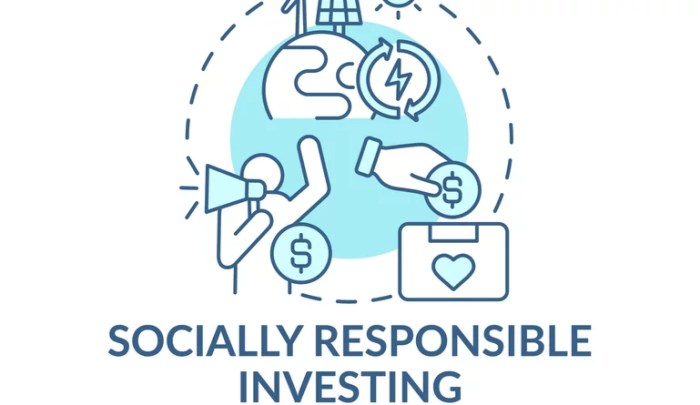Socially responsible investing takes center stage in this captivating narrative, offering readers an inside look at a story that is jam-packed with details and overflowing with originality right from the start.
Get ready to dive into the world of socially responsible investing, where financial decisions meet social impact in a dynamic and exciting way.
Definition of Socially Responsible Investing

Socially responsible investing (SRI) is an investment approach that considers both financial return and social/environmental good. It involves investing in companies that are committed to ethical practices and sustainability, while avoiding those that engage in harmful activities.
Examples of SRI Criteria and Goals
- Environmental Sustainability: Investing in companies that prioritize reducing their carbon footprint, using renewable energy, or promoting conservation efforts.
- Social Justice: Supporting companies that promote diversity, equality, and fair labor practices within their workforce.
- Corporate Governance: Investing in companies with transparent and accountable leadership, as well as strong ethical standards.
Importance of SRI in Modern Investing Practices
Socially responsible investing is crucial in today’s investing landscape as it allows investors to align their financial goals with their values. By supporting companies that make a positive impact on society and the environment, investors can drive change and contribute to a more sustainable future. Additionally, SRI has been shown to deliver competitive financial returns, debunking the myth that ethical investing comes at the expense of profitability.
Strategies for Socially Responsible Investing
In the world of Socially Responsible Investing (SRI), there are several strategies that investors can utilize to align their financial goals with their values. These strategies include negative screening, positive screening, ESG integration, and impact investing. Each approach has its unique characteristics and impacts on risk and return.
Negative Screening
Negative screening involves excluding certain industries or companies from an investment portfolio based on specific criteria. This could include avoiding companies involved in tobacco, weapons, or fossil fuels. While this strategy may reduce exposure to controversial industries, it could potentially limit diversification and returns.
Positive Screening
On the other hand, positive screening focuses on actively selecting investments that meet certain ESG (Environmental, Social, and Governance) criteria. This approach seeks out companies with strong sustainability practices or social impact initiatives. By investing in these companies, investors can support positive change while potentially achieving competitive financial returns.
ESG Integration
ESG integration involves incorporating environmental, social, and governance factors into traditional financial analysis. By considering these non-financial metrics alongside financial data, investors can gain a more holistic view of a company’s performance and future prospects. This strategy aims to identify companies that are not only financially sound but also socially responsible.
Impact Investing
Impact investing goes beyond just financial returns and aims to generate measurable social or environmental impact alongside financial gains. This approach involves investing in companies, organizations, or funds that actively contribute to solving social or environmental issues. Impact investors seek to achieve a double bottom line by supporting positive change while earning returns on their investments.
Companies like Patagonia, known for their commitment to sustainability and ethical practices, and funds like the Vanguard ESG U.S. Stock ETF, which focuses on companies with strong ESG performance, are examples of successful implementation of SRI strategies. These real-life examples showcase how companies and funds can align financial goals with social and environmental responsibility for a more sustainable future.
Impact of Socially Responsible Investing
Socially Responsible Investing (SRI) has the potential to create positive impacts on society, the environment, and corporate behavior. By integrating environmental, social, and governance (ESG) factors into investment decisions, SRI aims to promote sustainability and ethical practices.
Positive Impacts of SRI
- Socially responsible companies may contribute to community development, support human rights, and promote diversity and inclusion.
- Environmental considerations in SRI can lead to investments in renewable energy, conservation efforts, and reduction of carbon emissions.
- By aligning with companies that uphold strong governance practices, SRI can foster transparency, accountability, and ethical leadership in the corporate world.
Challenges and Criticisms of SRI
- One criticism of SRI is the potential for lower financial returns compared to traditional investments, as some socially responsible companies may face higher costs for sustainable practices.
- There is also the challenge of defining what constitutes socially responsible criteria, as different investors may have varying priorities and values.
- Critics argue that SRI may lead to limited diversification in investment portfolios, as certain industries or companies may be excluded based on ESG factors.
Impact on Market Dynamics and Investor Behavior
- SRI can influence market dynamics by shifting capital towards sustainable and ethical companies, potentially rewarding those that prioritize ESG factors.
- Investors engaging in SRI may become more engaged with companies’ practices, advocating for positive change and influencing corporate behavior towards more responsible actions.
- As the demand for SRI grows, companies may be incentivized to improve their ESG performance to attract socially conscious investors and remain competitive in the market.
Trends and Future Outlook for Socially Responsible Investing
Socially Responsible Investing (SRI) has been gaining momentum in recent years, with investors increasingly seeking to align their financial goals with their values. As we look towards the future, several trends are emerging that could shape the landscape of SRI and impact the financial industry as a whole.
Rise of Sustainable Investing
The rise of sustainable investing within the SRI space is undeniable. Investors are increasingly focusing on environmental, social, and governance (ESG) factors when making investment decisions. Companies that prioritize sustainability and ethical practices are attracting more investors, leading to a shift in the market towards more responsible business practices.
Green Bonds and Impact Investing
Green bonds have also been on the rise, providing investors with an opportunity to finance environmentally friendly projects. Impact investing, which aims to generate a measurable social or environmental impact alongside a financial return, is becoming more mainstream. This trend is expected to continue as investors seek to make a positive difference through their investment choices.
Role of Technology and Data Analytics
Technology and data analytics are playing an increasingly important role in advancing SRI practices. With the help of big data and artificial intelligence, investors can now analyze ESG factors more effectively and make more informed investment decisions. This trend is likely to continue as technology continues to evolve, leading to more sophisticated SRI strategies in the future.






